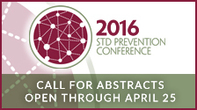Abstracts are being accepted for the 2016 STD Prevention Conference through April 25, 2016. The Conference theme: Transcending Barriers. Creating Opportunities., offers you the perfect opportunity to share your work in the areas of STD prevention research, program, policy, diagnosis, and treatment.
Abstract submissions are peer-reviewed for scientific content, logical presentation, timeliness, and current interest of the topic to the scientific community. Abstracts must be submitted no later than Monday, April 25, 2016 at 11:59pm PST. Instructions for submitting an abstract and a new resource to help guide you through the development process are available at the 2016 STD Prevention Conference website.
We look forward to seeing you September 20-23 in Atlanta and to exploring how to bring this year’s theme – Transcending Barriers. Creating Opportunities. – into our everyday work, and ultimately, maximizing the health of our communities.
Printer friendly version for call for abstract
2016 HIV Diagnostics Conference:
The New Landscape of HIV testing in Laboratories,
Public Health Programs and Clinical Practice
Abstract Submission Deadlines
|
Deadline |
Notification |
|
| Abstracts | October 30th, 2015 | December 15th, 2015 |
| Late Breaker Abstracts | January 15th, 2016 | January 27th, 2016 |
Abstract Topics
| HIV Testing Topic |
Data Needs |
|
|
Performance of HIV Tests in CLIA-Waived Settings |
Studies of the performance of rapid HIV screening tests and rapid test algorithms in CLIA-waived settings. Abstracts on newer rapid HIV tests, performance comparisons of multiple CLIA-waived tests and cost analyses are encouraged. | |
|
Performance of HIV Screening Tests in the Laboratory Setting |
Studies of the performance of CLIA Moderate and High Complexity HIV screening tests, including performance by specimen type. Abstracts on newer tests, performance comparisons of multiple CLIA-Moderate/High complexity tests and cost analyses are encouraged. | |
|
Performance of Supplemental tests in Diagnostic Algorithms |
Performance of HIV-1/HIV-2 differentiation tests, other serological antibody tests as supplemental tests. | |
|
Performance of Nucleic Acid Tests in Diagnostic Algorithms |
Performance of HIV-1 or HIV-2 qualitative or quantitative nucleic acid (DNA and/or RNA) tests in diagnostic algorithms. | |
|
|
CDC/APHL Laboratory Testing Algorithm |
Reports on the performance and implementation of the recommended algorithm, including cost analyses. Abstracts on algorithm performance with newer 4th generation immunoassays, including Ag/Ab combo rapid tests, and HIV-1/HIV-2 differentiation tests. |
|
Streamlining Test Result Turnaround Time and Linkage to Care |
Studies on the timeliness of test reporting and linkage to care, including implementation of new policies and procedures to improve turnaround time. Reports on self-testing are also encouraged | |
|
Testing of Alternative Specimen Types |
Performance of HIV tests using oral fluid, including comparisons with blood for antibody concentration or seroconversion performance. Studies of the performance and feasibility of using dried blood spots or other alternative specimens for HIV testing. | |
|
Special Diagnostic Circumstances |
Testing in the context of PEP and PrEP, diagnosis and management of acute infection, verifying diagnosis of persons on ART and elite controllers, and data on special populations (e.g., pregnant women, infants and children). | |
|
|
Integrated Testing for Multiple Pathogens |
Studies on the performance of rapid and laboratory-based tests using integrated testing platforms for HIV in conjunction with STDs or hepatitis. Abstracts on tests that have been or will be submitted for FDA approval are encouraged. |
|
Research & Development of New Tests for Diagnosis and Clinical Monitoring |
Research & development of new tests for diagnosis and monitoring of HIV infection (viral load, CD4, infection staging), including methods applicable to resource poor settings. Abstracts on tests that have been or will be submitted for FDA approval are encouraged. | |
Note: The CDC HIV Case Surveillance Branch (HICSB) will provide an update on HIV surveillance and reporting.
Late-Breaking Abstracts
The 2016 HIV Diagnostics Conference offers a late-breaking abstract deadline for abstracts that highlight novel and substantive studies of high impact. The goal is to enrich the conference with studies that are completed after the general abstract submission deadline.
Abstract Submission Guidelines
Scientific data abstracts should not exceed 350 words and can include one table and one figure separate from the abstract. The abstract should adhere to the following format:
- Objective: Study objectives, hypothesis tested, or description of the problem.
- Methods: Methods for testing and analysis, selection and origin of specimens evaluated, and standard used for comparison.
- Results: Specific results with appropriate statistical analysis
- Conclusion: Conclusions and implications
Descriptive summary abstracts should not exceed 350 words and can include one table and one figure separate from the abstract. The abstract should adhere to the following:
- Project: Description of the Project
- Issue: Specific project problems or needs addressed by the abstract
- Results: Qualitative or quantitative summary of implementation facilitators and barriers
- Lessons Learned: Summary of lessons learned and implications
Scoring Abstract Proposals:
Each abstract will be reviewed and scored based on the following criteria: all criteria will be given equal weight as has been done for previous conferences.
- Pertinence: The topic is consistent with the abstract category.
- Importance: The abstract contains relevant, innovative, or new findings.
- Methodology: The study design meets the abstract objective, and the quality of reported data is acceptable
- Clarity: The ideas and findings are communicated clearly and concisely.

